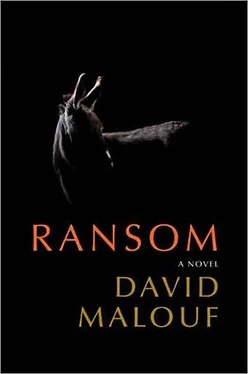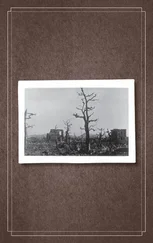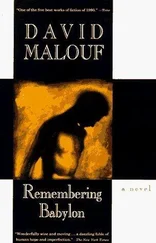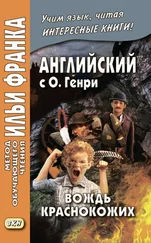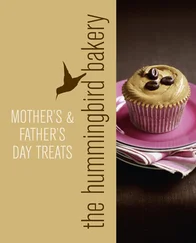The men, all closely crowded shoulder to shoulder, share a trestle table in the centre of the hut. Achilles sits apart, at a little folding table of inlaid ivory that his attendants, Automedon and his squire Alcimus, have set in a secluded corner where the torchlight does not reach.
Under the low thatched roof the air is thick with the smell of pitch from pinewood torches that sputter and pour out smoke and acrid fumes; and of animal fat and the sweat of unwashed bodies. The men are noisy. The noise they make gathers to an uproar, then lapses, then rises again, wave on wave, like the sea. Cups are banged down hard in drunken fists.
A quarrel breaks out. A shaggy head above a shaggier fur-clad shoulder looms in giant reflection against the flickering red of the deal-plank wall. Others leap to join it, and for a time they surge in lumbering shadow play, from which sweaty faces, wet mouths, black eye-pits, flare, half-dark, half-flame. Then the heave subsides, and the big shadows go back to being the solid bodies of men, who slap one another on the back and, shouting, crowd in close, shoulder to shoulder. In a quiet moment someone begins a rambling reminiscence, some old sadness or talk of home, and is roughly silenced. More wine is carried in.
Achilles barely notices all this. It is just the noise that grown men make when they are in company and afraid of where silence might take them. Trees in a blow make such a din. So do stones when they dash together.
He sits with a full cup of wine before him, eating only so that his attendants will be free to eat.
Now that Patroclus is gone, Automedon is his chief attendant, the driver of his chariot and his close body-servant. One of the noblest of the Myrmidons, he is a lean-jawed fellow of an impressive lankness, with eyes deep-set and reflective under thickset brows. What is happening around him seems never entirely within his grasp. He is in consequence the most cautious and reliable of men, doing all he does with perfect consideration and punctilious rectitude. But Achilles is not quite easy with him. He admires the man but is not drawn to him, as Patroclus was.
The fact is, he resents Automedon. His presence is both a reminder and a rebuke.
When the helmet was struck from Patroclus’ head and he went reeling, hot blood gushing from his mouth, it was this man, Automedon, who ran to lift him up, and holding him close in his arms, watched the light that moved cloudlike across his gaze as the bright world dimmed, and crying out and leaning closer, caught the last breath at his lips. It was Automedon who stood astride the body and, blinded by tears, fought the Trojan jackals off.
Him, Achilles tells himself bitterly, not me. In his arms, not mine.
It is because he resents Automedon that Achilles has made him his squire. Patroclus, he knows, would expect nothing less of him. But the thought is there, always. Him, not me — and it rankles.
Automedon, alert to every mood in Achilles, is aware of this. He recognises Achilles’ grief; he too is grieving. He loves the man, and not only for Patroclus’ sake, and does not let the hurt he feels affect the attention he gives to even the smallest and most unspoken of Achilles’ needs. Ever watchful, when Achilles gives the sign at last, he nods to Alcimus and they draw stools up to the table and join him.
They are young, these men, and have hearty appetites. Forcing himself, Achilles takes something from each of the dishes they have set before him — scallions, a handful of olives, bread, a little sour cheese. The wine they have mixed and poured he barely touches.
Automedon tries not to make it obvious that they have been holding back. But Alcimus, who is just a boy, does not. When Achilles has served himself, his big hands go quickly to the platter of roast meat, the bread in its woven basket, and his jaws work horribly over the gobbets of fat.
Automedon, Achilles observes, says nothing. He does not have to. Suddenly conscious of the sound his chewing makes, Alcimus swallows the last pieces whole, and when he sucks the grease from his fingers it is in a restrained, maidenly way that is almost comic.
Achilles is fond of Alcimus and feels sorry for him. He would rather, he knows, be with the others, banging his cup down on the trestle table and tearing at his food as he shouts to be heard above the crowd. It is this overabundance in him of an animal nature he has not yet learned to subdue that Achilles finds endearing in the youth, and which makes his lapses into hulking awkwardness so easy to forgive. He likes to have Alcimus by him. For his own sake, but as a reminder too of what he himself was just a season ago.
Once again he reaches into a dish so that his companions can seize the occasion and do likewise. Takes a skewer of meat. Turns it in his fingers. Puts it back.
Now, in the smoky darkness at the far end of the hut, a hand sweeps across sounding strings. Achilles raises his head.
A god moves invisible among them, and in the wake of his passing the full-throated shouting of the Myrmidons is cut off. The silvery notes of the lyre touch and change the air. When the voices start up again, as they do soon enough, they are not so loud that the music cannot be heard beneath them. It persists. And so, for Achilles, does the chord the music has struck in him.
He knows what this sudden suspension of his hard, manly qualities denotes. This melting in him of will, of self. Under its aspect things continue to be just themselves, but what is apprehensible to him now is a fluidity in them that on other occasions is obscured. The particles of which they are composed, within the solid forms, tumble and swarm. As if flow, not fixity, were their nature. The world swims, and for as long as the mood lasts he too is afloat.
He has moved into his mother’s element and is open again to her shimmering influence. In such moods he sees things — a thickening of the half-light beyond Automedon’s shoulder that strikes him first as a startling of his blood.
A figure, as yet all hovering vagueness, has begun to take shape there.
Patroclus, he breathes. You! At last, at last! He watches spell-struck as the figure advances through the smoky dark towards him.
But this is no young man. His disappointment dissolves in another, deeper sorrow.
The figure, tall, spare, wearing a white robe without decoration, is old. The loose flesh under the chin hangs in wrinkled folds, the eyes deep-set under knotty brows.
Father?
It is half a question this time. Slowly he rises from his seat.
Alcimus glances at Automedon, then back across his shoulder to see what is there. He sees, and he and Automedon start up both and reach for their swords. Achilles, half-risen, continues to stare.
It is nine years since Achilles last saw his father. When he sailed from Phthia he was little more than a boy, already fully grown and well-made but with few signs upon him of the man he has become — a warrior, deep-chested, thick in the shoulders and neck, his features roughened by long months of bivouacking on the open plain. It is what time has done to him. And it strikes him now, in a great wave of sadness, how much his father too is changed.
The Peleus he left, who had clasped him so strongly to his breast, reluctant to the point of tears to let him go, had been in the prime of life, strong-thewed and warrior-like, a man to be feared. The figure who comes to him now is still noble-looking and tall, but all his muscles are slack. The hair, once thick and iron-grey, is thin and of a fleecy whiteness.
‘Father,’ he says again, aloud this time, overcome with tenderness for this old man and his trembling frailty. ‘Peleus! Father!’
The great Achilles, eyes aswarm, is weeping. With a cry he falls on one knee, and leans out to clasp his father’s robe. Automedon and Alcimus, their swords now drawn and gleaming, leap to his side.
Читать дальше
